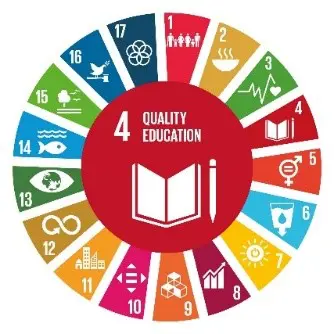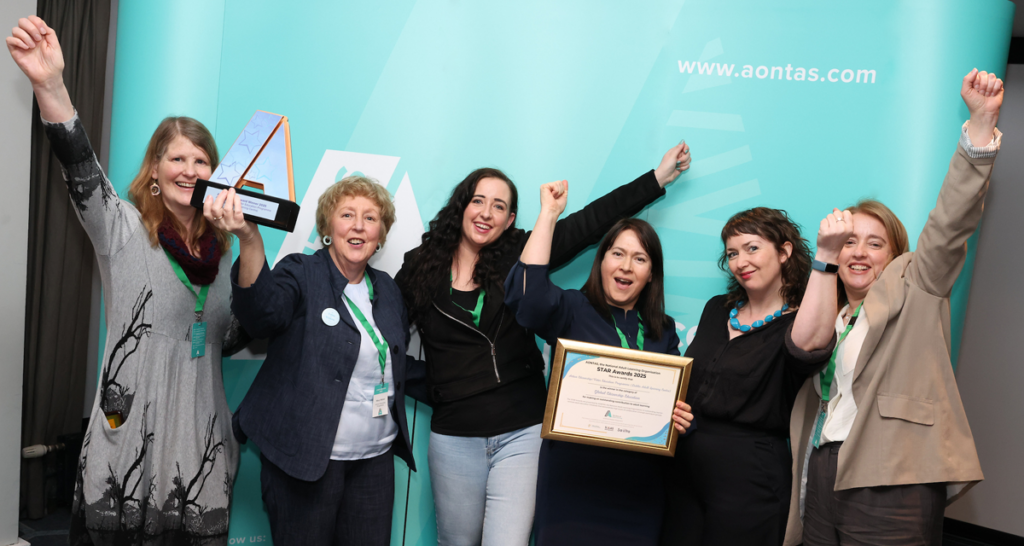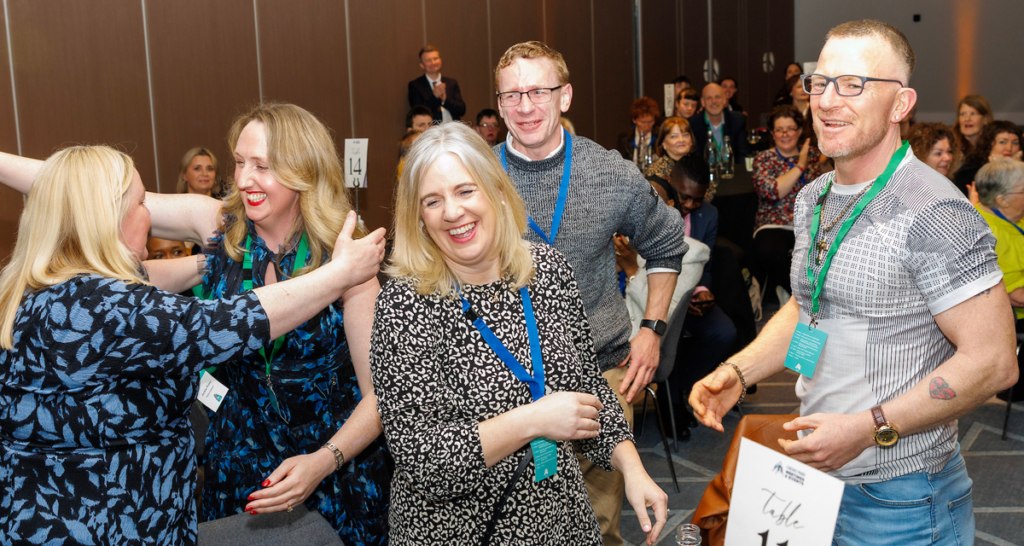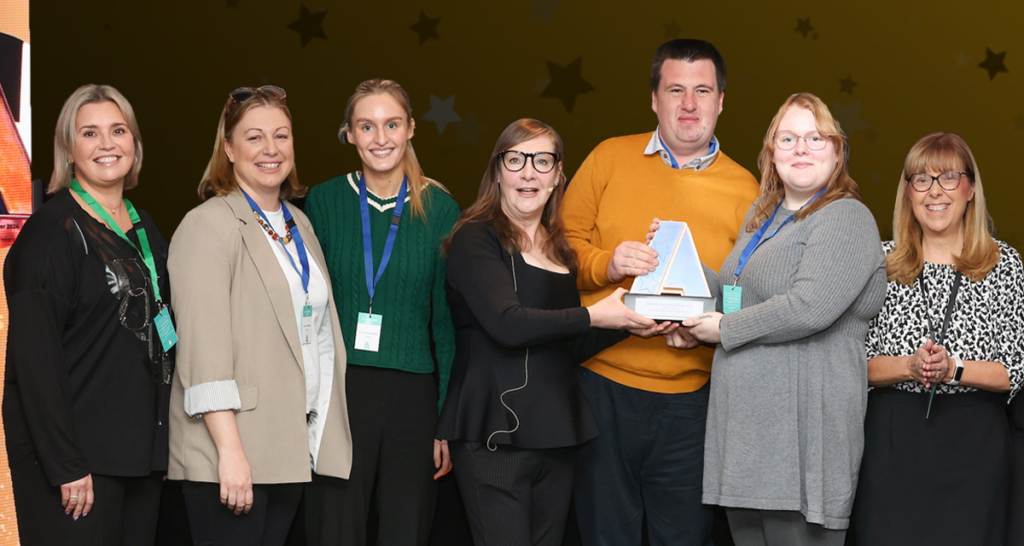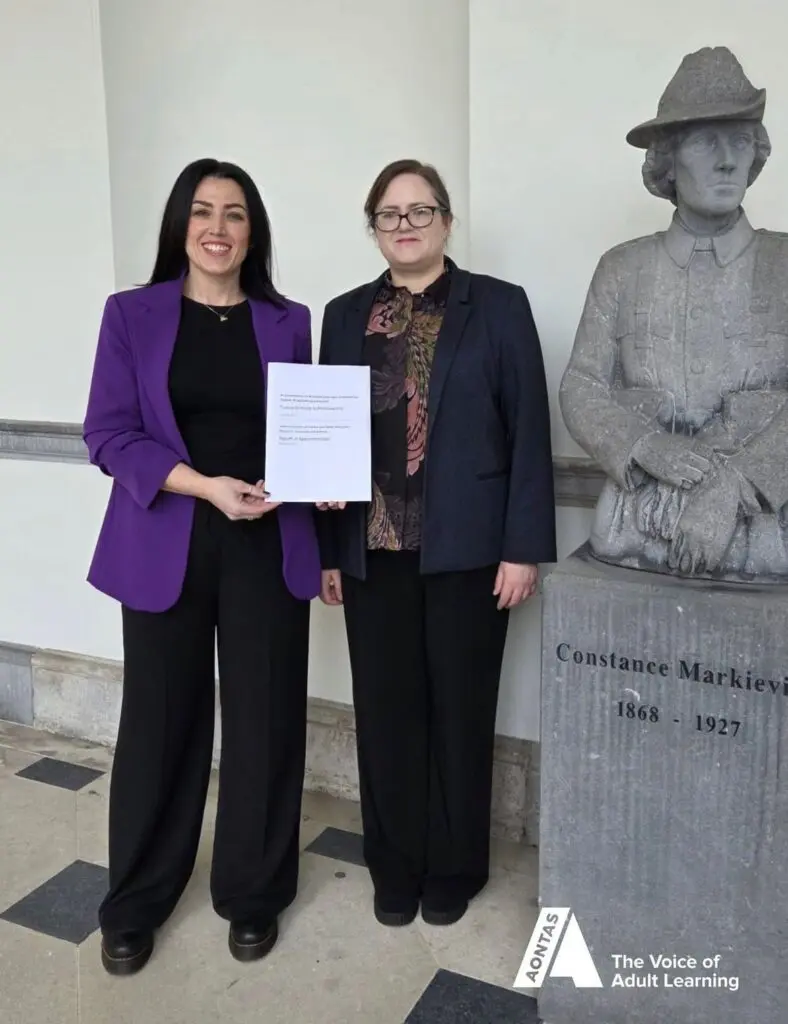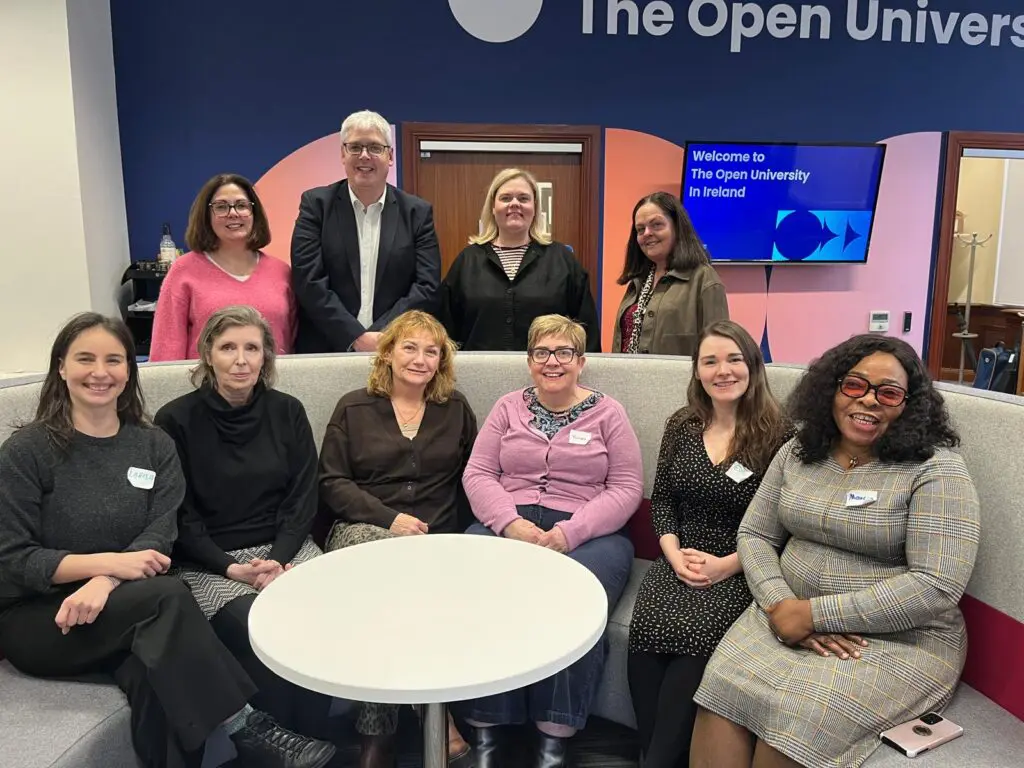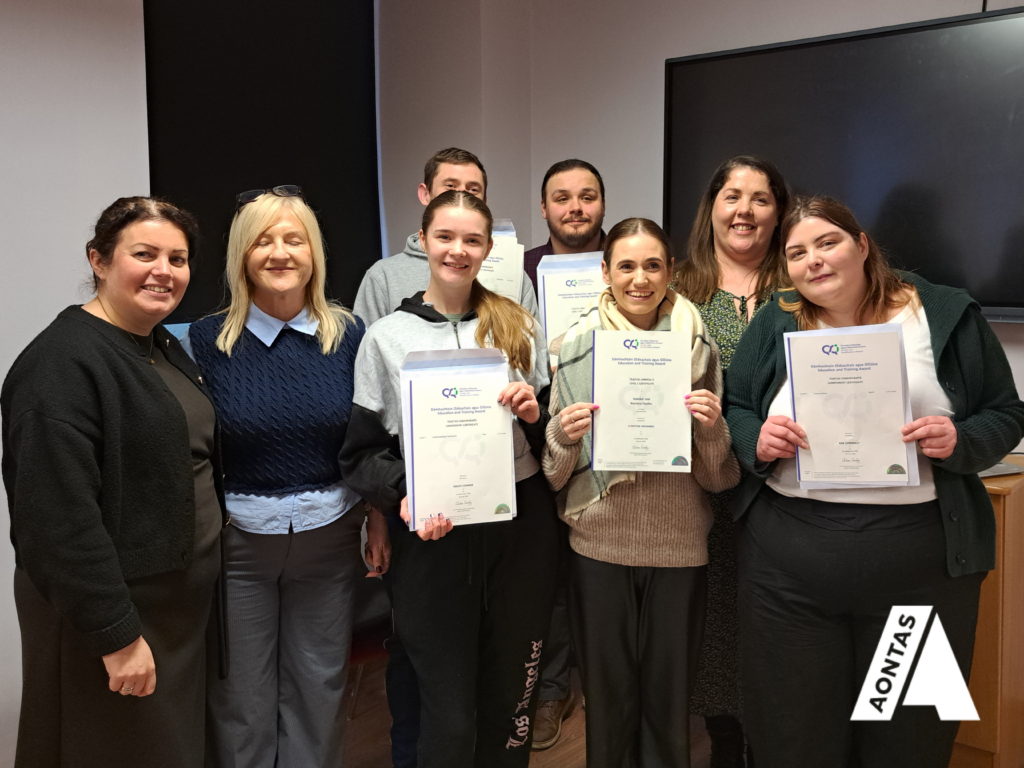‘The 2030 Agenda is a global agenda but its substance is equally important and relevant to our own daily lives here in Ireland. Together with ending global poverty and combatting harmful climate change, the SDGs also aim to make our towns and cities cleaner and safer, to ensure people have access to decent jobs, to promote better health and education for all, and to end all forms of inequality including gender inequality and discrimination.’
Sustainable Development Goal 4 (SDG4) aims to “ensure inclusive and equitable quality education and promote lifelong learning opportunities for all” and is made up of 10 targets.
The most relevant targets specific to adult and community education (ACE) are SDG 4.3, 4.5 and 4.7 because, very much like local ACE provision nationwide, they promote equality, fight poverty and discrimination, and are concerned with increasing civil and human rights, peace and prosperity, strengthening democracy and increasing global citizenship, as well as supporting anti-racism through recognising cultural diversity as a strength that enriches our communities:
|
|
|
 |
|
 |
What is AONTAS doing to achieve the SDGs?
A clear example of AONTAS’ commitment to the SDGs, and to making a just transition to a greener more equitable and sustainable Ireland, can be found in Goal 3 of the organisation’s Strategic Plan for 2019-2022. As well as making sustainability one of its three main goals, AONTAS became a member of Coalition 2030 (C2030) in 2019 and attended the first plenary session of 2020 in late February held in the Irish Human Rights and Equality Commission. C2030 is an alliance of approximately 75 civil society organisations with a combined reach of millions of people working together to deliver the SDGs and supporting Ireland’s commitment to the United Nations Sustainability Agenda 2030. The coalition is made up of both international and domestic NGOs along with youth organisations, environmental groups, academics, and trade unions. Its members work across a broad range of areas from humanitarian relief to labour rights and environmental sustainability and C2030 exists in over 50 countries around the world. This diverse partnership has come together around the belief that the global development plan agreed to 5 years ago must be fully implemented and its promises kept to essentially save our own species and many others.
The deadline for delivering on these promises is 2030 – that is in 9 years and 9 months’ time.
Educational equality and the environment
As the National Adult Learning Organisation; Coordinator of the Community Education Network; and as Ireland’s National Coordinator of the European Agenda for Adult Education, AONTAS is well positioned to facilitate the invaluable contribution which adult and community-based learning can make to Ireland achieving the UN SDGs. As part of this work, AONTAS attended Social Justice Ireland’s recent Global Justice Day Seminar 2020 which saw the launch of their Sustainable Progress Index for 2020. The Index measures Ireland’s performance on social, economic and environmental indicators. It compares Ireland to ‘the EU-15’: Austria, Belgium, Denmark, Finland, France, Germany, Greece, Ireland, Italy, Luxembourg, Netherlands, Portugal, Spain, Sweden and United Kingdom. Two of the standout findings of the Index are, on the one hand, how well Ireland seems to be doing regarding SDG4 on Education and, on the other hand, how poorly the country is doing in terms of the more closely interrelated environmental targets, such as SDG6 ‘Clean Water and Sanitation’; 7 Affordable and Clean Energy’; 13 ‘Climate Action’; 14 ‘Life below Water’; and 15 ‘Life on land’).
Regarding the environment, the picture painted by Social Justice Ireland is relatively bleak. Results contained in the Index for 2020 imply Ireland has a long way to go to meet the aims of Agenda 2030:
‘[T]here are pressing sustainability issues that must be addressed, as reflected by the ranking of SDG 7 ‘Affordable and clean energy’, SDG12 ‘Responsible consumption and production’, SDG13 ‘Climate action’ and SDG14 ‘Life below water’. The low score of SDG 9, ‘Industry, Innovation and Infrastructure’, also points to significant challenges ahead in this area’.
In short, Ireland is struggling and ranked last among the EU15 for meeting our commitment to these environment goals.
Regarding education, there seems to be progress. Recent PIAAC and OECD research offers some positive general statistics which indicate how well Ireland’s learners are doing in compulsory and formal settings such as primary school, at second level and in higher education. However, these broad strokes fail to include data on how vulnerable and marginalised adult learners in community education settings, and non-formal education, are faring. Even regarding primary and second-level learners, there are significant caveats. For example, the ESRI has shown that for members of the Traveller community just 9% sit the Leaving Certificate; and Travellers are over 50 times more likely to leave school without the Leaving Certificate in comparison to the ethnic majority settled population. Furthermore, only 1% of Travellers have completed third level education compared to 31% of the general population. Simply put, as soon as you scratch the surface of recent reports using national-level statistics, the stark contrast between educationally advantaged learners and their disadvantaged counterparts is revealed. Although in general terms more Irish learners may be doing better than many of their fellow Europeans it is also clear that they are doing far better than those experiencing poverty and discrimination within Ireland too. When we drill down into the figures we see how educational disadvantage can be even more concentrated for specific communities and may accumulate over generations; those who are excluded from participating in (and benefiting from) education are being left even further behind. Although there are complex factors involved in the marginalisation of adult learners and their communities, with deep intergenerational dimensions, these are often down to longstanding policy decisions and straightforward structural barriers. At the root are systemic failures preventing adults from equally accessing, participating and progressing in education. The issues surrounding Ireland’s rates of lifelong learning participation and educational attainment are products of structural deficiencies which exclude people and not the outcome of individual learners’ personal failures or due to inherent flaws peculiarly located in certain postcodes. For example, Ireland currently has a 12.5% lifelong learning participation rate. However we know that only 4.4% of adults who left school early participate in lifelong learning (Eurostat). Evidence of these disparities fly in the face of what most SDGs are aiming to achieve.
To realistically be able to deliver on the SDGs Ireland must enhance and strengthen the role of adult and community education (ACE). An all-of-Government approach that better integrates the efforts of ACE, including Development Education as a key constituent, within tertiary education would support Ireland to (a) fulfil its obligations, not only in terms of SDG4 and ensuring that progress in educational equality is truly occurring and experienced by all adult learners, but also (b) improve human rights, ensure peace across the island and develop responsible active citizenship while increasing gender equality. These efforts combined would create better outcomes across a range of national strategies (such as the Roadmap for Social Inclusion 2020-2025) and international Conventions (like CEDAW). In all of these priority policy areas which are used to measure Ireland’s progress ACE has a distinctive advantage over other forms of education:
- ACE is diverse by design and unique in nature. It is rooted in the specific and differing needs of each and every community so its strength lies in how it is both comprehensive and yet flexible enough to tackle the global challenges which play out in local settings.
- ACE has the innate capacity to focus on the cognitive and non-cognitive aspects of learning while simultaneously drawing on and building up the local, national and global knowledge, skills, values and attitudes required to lead positive, productive and meaningful lives as part of a wider society that values wellbeing over unsustainable and unethical economic expansion.
- Moreover ACE comes complete, as a package consisting of a sound theoretical foundations upon which an applied methodology has proven results to bring about solution-focused transformative processes which support critical thinking, democracy, global citizenship, peace and human rights, as well as intercultural understanding. In short, many if not most of the essential ingredients which can help ensure Ireland’s just transition to a green economy which achieves the SDGs can be found within ACE.
An excellent example of ACE’s capacity to achieve the SDGs is the Saolta Project. As a project partner AONTAS is focusing on a variety of global and local issues such as poverty, inequality and climate change with stakeholders from the adult and community education sector with the aim of encouraging action across Irish society.
Harnessing adult and community education to achieve the SDGs
Adult and community education providers and learners can and do play a significant role in Ireland’s efforts to achieve the SDGs by empowering people and their communities to become agents for positive personal and collective change. ACE functions as an approach to, means for and outcome of reducing poverty and gender inequality; contributing to economic growth through creating and sustaining more and better employment; as well as driving innovation, strengthening resilience and developing healthier lifestyles to adapt to an ever changing and increasingly precarious political, social and economic environment. Those who won and were shortlisted for the AONTAS STAR Awards are living proof.
In a recent Irish Times article Carl O’Brien outlined the findings of an Accenture Report on how prepared students coming from formal and compulsory education are for the working world. The article, entitled Graduates ‘not well-equipped’ for future workplace, quoted the managing director at Accenture in Ireland saying that students’ preparedness, or the lack thereof, was “a call to action for a stronger approach to how government, business and education can work together to shape a society in Ireland fit for the opportunities of tomorrow”. This may certainly be the case, but with only ten years left on the climate clock Ireland must embrace a much greater vision; Ireland must take action around how government, civil society, and education can work together to shape a sustainable society fit for achieving more SDGs faster.
Social Justice Ireland’s Report makes a number of recommendations which echo AONTAS’ advocacy work calling on Government to:
- Make combatting educational disadvantage a priority;
- Deliver a long-term, sustainable, appropriately funded education strategy that takes a whole-person, life-cycle approach to learning;
- Support high-quality community childcare, particularly in disadvantaged areas;
- Enhance community education programmes and life-long learning.
There has been an enduring lack of imagination, a stifling of local community-based innovation and a significant leadership gap from decision makers; resulting in the insistence of tethering education to economic indicators and industrial needs that are no longer fit-for-purpose in a post-Paris Climate Agreement world. These primarily econometric-based strategies for creating and measuring ‘progress’ are perennially proven to fall short of actually improving or accurately reflecting individual and collective wellbeing, and more importantly the health of the planet.
|
The dominant discourse around the fundamentally economic purpose of education within society is simply obsolete. This narrative is unsustainable and has become unjustifiable in the face of the climate crisis. The stakes are too high. Education is not only about the economy or solely to supply skills within the labour market. It never should have been and now, more than ever before, education needs to be about much more. Education needs to be about
|
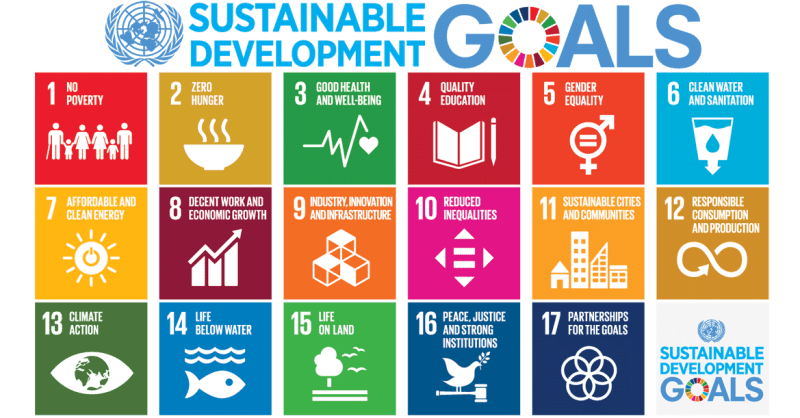 |
If you would like to get involved or find out more information, please contact Information and Policy Officer Sam O’Brien-Olinger on sobrienolinger@aontas.com or 01 406 8220.
